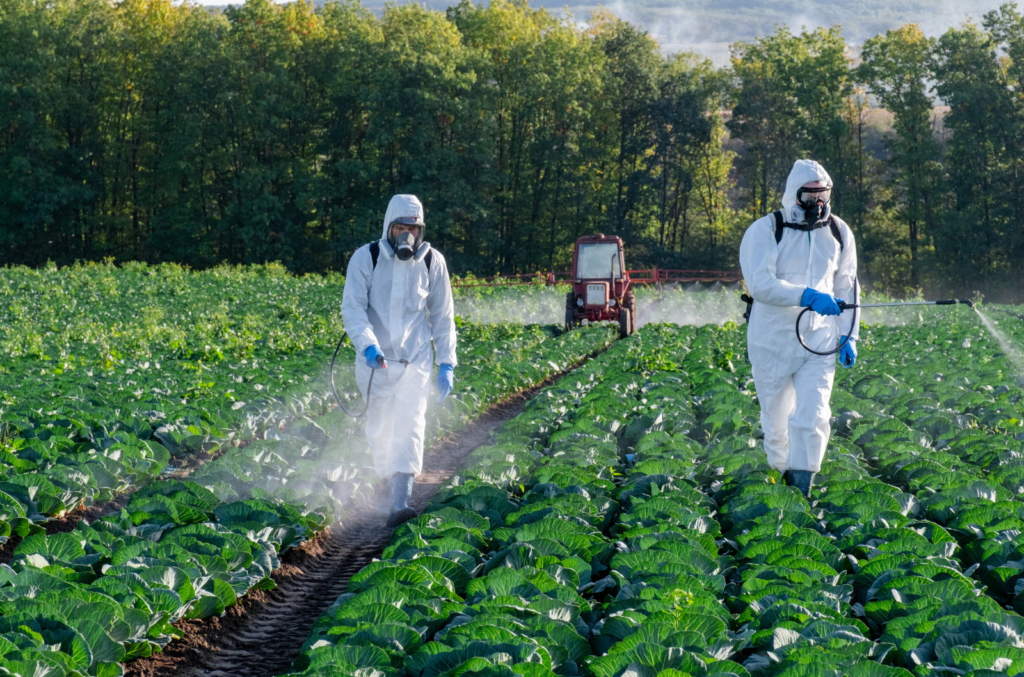
The decision to reauthorize the use of glyphosate in agriculture for a period of 10 years by the European Commission on November 16 has sparked a flurry of reactions in France. The Commission’s move comes due to the lack of consensus among the 27 EU member states, where a majority of 15 states representing at least 65% of the European population was required for either prohibition or authorization.
In response to this decision, particularly contentious in France, where President Emmanuel Macron had pledged to outright ban the controversial herbicide in 2017, there has been sharp criticism. Pascal Canfin, Macronist and President of the Environment Committee in the European Parliament, denounced the decision as a “forceful move” by Ursula von der Leyen, the President of the European Commission, especially considering that the three largest agricultural powers in the continent (France, Germany, and Italy) did not support the proposal.

This perspective has drawn strong reactions from ardent supporters of glyphosate prohibition, characterizing France’s stance as a timid “abstention” rather than an outright vote against, in line with the notion of “silence implies consent.” Marie Toussaint, an MEP and lead candidate for The Greens in the upcoming European elections, criticized the French government, stating, “The government could have sent a strong signal by voting against the renewal of glyphosate. Instead, it abstained. Their responsibility is complete.” Similarly, Manon Aubry of the political group La France Insoumise commented on the situation, accusing the government of not building an alternative and opposition and choosing to abstain instead of taking a clear stand.
The Socialist Party, in a press release, criticized the government for not voting against the authorization for ten years, emphasizing that a promise made by Emmanuel Macron was left unfulfilled.
Environmental NGOs also expressed disappointment with the French position. Greenpeace had urged Paris to oppose the reauthorization before the vote, emphasizing Macron’s 2017 promise to phase out glyphosate within three years.
In response to criticism, Pascal Canfin defended France’s position, stating, “France abstained, which is equivalent to not supporting this proposal. The country that could have tipped the balance is Spain, led by a socialist government, and they voted in favor!”
The French government officially expressed regret over the European Commission’s decision, stating that “France is not against the principle of renewing the molecule.” However, this nuanced stance has been criticized as a “both sides” approach by environmental advocates.
According to Foodwatch and Générations Futures, this position by France, not opposing the decision, “is, without surprise, a betrayal of the promise made by the President of the Republic in 2017.” These associations argue that this outcome, which France did not oppose, “again goes against the precautionary principle as evidence of the danger of glyphosate to humans and the environment continues to accumulate.”

The question of the relationship between glyphosate exposure and cancer incidence is complex and has been a subject of scientific inquiry. It’s important to note that scientific studies often provide varying results, and the interpretation of these findings can be influenced by factors such as study design, exposure levels, and population characteristics. Here are some key points:
Glyphosate and Cancer Risk
- The International Agency for Research on Cancer (IARC), in 2015, classified glyphosate as a “probable human carcinogen,” specifically associating it with non-Hodgkin lymphoma.
- Other regulatory bodies, such as the U.S. Environmental Protection Agency (EPA) and the European Food Safety Authority (EFSA), have concluded that glyphosate is unlikely to pose a carcinogenic risk to humans when used according to label instructions.
Studies on Agricultural Workers
- Some studies have investigated the potential link between glyphosate exposure and cancer risk among agricultural workers.
- The Agricultural Health Study (AHS), a large prospective study in the U.S., has not found a consistent association between glyphosate exposure and cancer, including non-Hodgkin lymphoma.
Alcohol and Cancer
- Alcohol consumption has been identified as a risk factor for certain cancers, particularly cancers of the liver, breast, and esophagus.
- The relationship between alcohol and cancer is influenced by factors such as the amount and duration of alcohol consumption.
Outdoor Work and Cancer
- Outdoor workers, including agricultural workers, may have different cancer risks compared to the general population due to factors like sun exposure, pesticide use, and other occupational exposures.
- Occupational exposure to certain substances, including pesticides, is a concern for the health of agricultural workers.
Complex Factors
- Cancer risk is multifactorial, and it’s influenced by a combination of genetic, environmental, and lifestyle factors.
- Different cancers may have distinct risk factors, and the overall incidence of cancer can vary based on various demographic and geographical factors.
In summary, the relationship between glyphosate exposure and cancer risk is complex, and findings from studies can be conflicting. The assessment of cancer risk involves considering multiple factors, and it’s essential to rely on comprehensive scientific reviews and regulatory assessments to form evidence-based conclusions. The specific details and numbers can vary based on individual studies and their methodologies.
Related Content
- Humanoid Healthcare Assistive Robot Market Pioneers Technological Advancements, Reshaping Global Healthcare Landscape
- Catfit Health&beauty Matcha Tea Slimming Weight Loss Flower Knows Detox Tea Flat Tummy Products Loss Ketogenic Diet Supplement
- Mutsweet Detox Tea Colon Cleanse Fat Burning Weight Loss Tea For Men & Women Belly Fat Burner Slim Healthy Food
- HFU Health Liver Detox Tea Protect Liver & Lungs Improve Lung Function Suit For People Stay up and Alcohol Tea Polyphenols
- Herbal Milk ThistleTea, Liver Protection, Enhance Liver Function, Stay Up Late, Liver Fire Health Teabags less Tea Polyphenols
- Delhi air pollution spikes to 100 times WHO health limit
- No qualified majority reached by Member States (europa.eu)
- EU commission to prolong use of controversial herbicide glyphosate for 10 years (france24.com)
